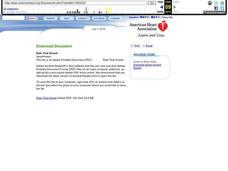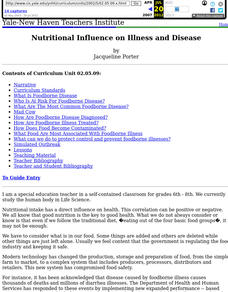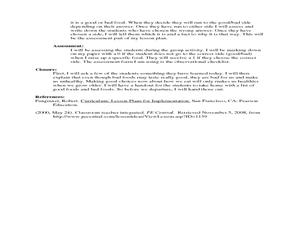Curated OER
Rate Your Family's Plate
Students examine their family's eating habits. In this adult health lesson, students share what they think from the survey facts presented to them. They set a goal for their family's health.
Curated OER
Lose the Fat, Keep the Vitamins... Drink Low fat Milk!
Pupils compare the different types of milk. In this adult health lesson, students examine the label and determine which is the healthiest. They discuss ways to switch from high fat to lower fat milk.
Curated OER
Try Something New with Fruits and Vegetables
Students share what fruits and vegetables they bought with their WIC checks. In this adult health lesson plan, students discuss different ways to prepare fruits and vegetables. They view a cooking demo and try it at home.
Curated OER
Sometimes and All the Time Foods
Students recognize a wide variety of fruit and have a greater understanding about the importance of fruit in their diet, and determine that some fruits' skins are edible and others are not.
Curated OER
Rate That Snack!
In this nutrition worksheet, students keep track of all snacks eaten for a three day period. Students record the name of the snack, nutritional information, where and when it was eaten, and a rating by the student.
Curated OER
Food Labels
Students study nutrition and the facts about food labels. In this investigative instructional activity students examine food labels and the health facts and serving sizes.
Curated OER
Coming Soon: Sodas with Vitamins
Students react to a series of statements about sodas, then read a news article about the addition of vitamins to sodas to increase sales. In this nutrition and current events lesson, the teacher introduces the article with a discussion...
Curated OER
3-Every-Day of Dairy: Nutrient Package
Students discover the importance of calcium in their diets. In this nutrition instructional activity, students participate in an activity that requires them to conduct surveys regarding dairy and assessing what they eat. Students...
Curated OER
Try It Final
In this health worksheet, students practice reading the information for keeping healthy with an emphasis upon diet. Then they fill out a menu.
Curated OER
Nutrition: Why do we need rice in our diet?
Second graders discover what the Food Guide Pyramid represents. In this health lesson, 2nd graders experience the types of foods represented in each of the groups found in the pyramid. As part of this lesson, students discover one food...
Curated OER
Health and Nutrition
Fifth graders explore nutrition and health ideas to maintain their energy. In this energy lesson, 5th graders read information about ways to keep their energy boosted. Students keep a diary of what they each and create a chart for the...
Curated OER
The Secreat to Good Health: Eating Right and Exercise
Students create a seven-day record of all the foods they consume. They analyze what type of food was the most frequent in everyone's diet. They look up each food and record its daily recommended amount.
Curated OER
Exploring MyPlate
A PowerPoint presentation thoroughly details the 2011 MyPlate recommendations. The class is given a blank MyPlate worksheet to label and color as they watch the presentation. Although the content is informative and the presentation...
Curated OER
How Much Nutritional Value Does Rice Really Have?
Fifth graders see the nutritional value of rice. In this healthy eating lesson, 5th graders view the Food Guide Pyramid and the number of servings one is supposed to eat in each food group. They focus on rice and its benefits for the body.
Curated OER
Nutritional Influence on Illness and Disease
Students examine nutritionally related diseases and illnesses, evaluating studies and developing topics for a science fair project. They investigate bacteria, researching how it can be harmful or helpful, and create illustrated displays.
Curated OER
Getting the Most Nutrition from Your Food
Sixth graders explore human health by participating in a nutrition activity. In this food choices lesson, 6th graders review the food pyramid in class and identify the specific classifications of food that create positive health for...
Curated OER
Nine Months in Six Weeks
Student study possible effects the mother's nutritional habits will have on her baby. They see how important it is to eat right and examine a regular diet for a pregnant woman or one for a woman with diabetes or other physical problems.
Curated OER
Super-sized! Is it really a deal?
Students discuss the pros and cons of eating in fast food places. In this adult health lesson, student examine the fat and calorie content of fast food meals. They share ways to make healthy food choices.
Curated OER
Choose Your Vegetables
Students explain the importance of incorporating vegetables in their diet. For this adult health lesson, students identify common and uncommon vegetables in their area. They discuss ways to prepare and store them for future use.
Curated OER
5 A Day
Students examine their family's fruits and vegetables intake. In this adult health lesson, students share how they prepare certain vegetables. They explain why it's important to eat a healthy diet.
Curated OER
Cooking with WIC Foods
Students share ideas about how they use their WIC foods. In this adult health lesson, students discuss benefits of eating a healthy diet. They create recipes using WIC food supplies.
Curated OER
Let's Go Shopping!
In this nutrition worksheet, students investigate the need for a balanced healthy diet by making a shopping list. Students cut out 24 grocery items. Students paste desired items in the grocery cart and color all the pictures.
Curated OER
Don't Forget the Bacon
Students choose healthy food from different food groups. In this health lesson, students classify pictures of food into each food groups and discuss which ones are healthy. They review the food pyramid and read the story Don't Forget the...
Curated OER
Diet and Exercise Activity
Students explore their physical abilities by participating in team sports. In this physical education lesson, students collaborate in groups in one of several team sports before moving on to the next station. Students discuss healthy...

























